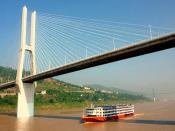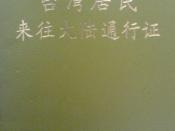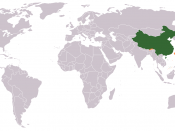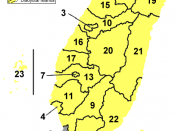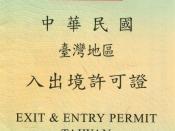Does Beijing intend to use military means to unify with Taiwan? Discuss the pros and cons of such a strategy.
Some sixty years ago, following its defeat in the Civil War with the Communists, the leaders and the army of the Chinese Nationalist Party withdrew to the off-shore island of Taiwan. For all of these intervening years the possibility has existed that the Communists would seek to militarily re-unify Taiwan with mainland China. This possibility has increased over the past three decades because of the growing military power of the Communists. This 'Taiwan issue' has dominated relationships not only between the Communist mainland - the People's Republic of China (PRC) - and Taiwan but also between the PRC and Taiwan's main protector, the United States of America (USA), and indeed western capitalist countries in general. It has become a key factor shaping China's overall foreign policy and, arguably, its internal political development which, in turn, affects the future of East Asia and beyond.
In short, for decades, the Taiwan issue has been one of the potential flashpoints between the PRC and the West. But would the flashpoint actually ever explode? Does Beijing intend to use military force to re-unify with Taiwan? Certainly the experiences of the 1980s and of the 1990s would suggest that the answer to this question could be in the affirmative. Even the more cordial relationship between the PRC and Taiwan over the past two years should not disguise this possibility. Accordingly, this essay examines the possibilities of military unification. It discusses the range of factors and possible developments that would influence the decision of the PRC and concludes that, on balance, because it would not be to the advantage of the PRC, Beijing will not initiate military action to attempt unification with Taiwan.
The three key determinants of the likelihood of any invasion are military capacity, political will and the possible consequences of such action. Over the last decade, China's military budget has expanded at a double-digit rate almost every year. It has continually procured or developed advanced weaponry, conducted training and preparation for information warfare and, at times, specifically deployed its military might against Taiwan. For example, in a military drill conducted between March 8 and 15, 1996, China test-fired four Dongfeng 15 missiles towards Taiwan. This action triggered the so-called Taiwan Strait Missile Crisis and invoked concerns in the international community . The 1996 incident was one of the closest face-to-face confrontations between the USA and the PRC since the 1950s, when two other Taiwan Strait crises occurred . During the 1996 crisis, the United States significantly strengthened Taiwan's military forces: it provided a range of hard weaponry, such as fighter-planes and weapons, and soft, support skills such as logistics, training and strategic advice. With the help of the USA the Taiwanese military emerged from the crisis stronger and more powerful than before. Perhaps not unexpectedly, this direct USA assistance to Taiwan was subsequently regarded by the PRC as a violation of the USA commitment to the One-China policy agreed in an earlier Sino-USA Communiqué. Again not unexpectedly, Communist China commenced a build-up of its military capacity to, presumably, prepare for any direct conflict with either Taiwan or the United States. For example, the number of ballistic and cruise missiles that the PRC has deployed across the Taiwan Strait increased from around 200 in 2000 to 988 in 2006 , with the current figure likely to be well in excess of 1000. Such actions represent clear proofs of China's potential military threat and its apparent preparations to invade Taiwan.
In contrast to China's rising military budgets, now estimated to account for 4-5 per cent of its gross domestic product, Taiwan's total defence budget peaked in 1994 and thereafter declined, currently comprised of about 2.5 per cent of Taiwan's GDP . Analysts predict that, because of the disparities in armaments procurement, the conventional force balance across the Taiwan Strait is likely to tip towards the PRC over the next 5-10 years. The issue of Taiwan's defences is further compounded by its domestic politics. For example, in an attempt to demonstrate the then ruling administration's ineffectiveness the opposition party which controlled the legislative majority vetoed the government's bill to procure advanced weapons offered by the USA in 2001 . Furthermore, unless Taiwan is able to implement a major procurement project according to Taiwan's Ministry of Defence the PRC will enjoy a nearly 3 to 1 advantage in total combat capabilities over Taiwan at some point between 2020 and 2035 . This PRC military superiority means that even if the Taiwan military could hold off a full assault, Taiwan would suffer substantial damage in the process . Blockade and missile-strike scenarios could also cause it great harm. In fact, even a limited blockade conducted by China's modest modern submarine force could stand a reasonable chance of dragging down Taiwan's economy-and keeping it down for a prolonged period .
Does the PRC have the political will to utilise such military superiority? Since 1949, the PRC has considered Taiwan a renegade province, and has repeatedly threatened to use military power against the island if it declares independence. Over the years, it has never altered its intention to annex Taiwan, whether by political or military means. As recently as March 2005, its legislature passed the anti-separation law in an attempt to unilaterally change and undermine the cross-strait status quo . This law authorizes China's Central Military Commission to adopt non-peaceful means to resolve the Taiwan issue. In providing a legal context for a possible future military invasion of Taiwan, this law constitutes a grave threat to the lives and property of the people of Taiwan . Further, in October 2007, PRC President Hu Jintao, at the 17th Communist Party Congress, stated: "we are willing to try our best, with all sincerity, to realize the peaceful reunification of our Motherland, but we will never allow anyone to separate Taiwan from China under any name or in any form" . Arguably, as well as the military power, the PRC has the political will to re-unify with Taiwan through military action.
But is such an invasion likely? Occasional military threats and legislation notwithstanding, the Chinese leadership seemingly understands the dangers involved in pushing the reunification agenda against the wishes of the Taiwanese public. In broader political terms, attacking Taiwan would be extraordinarily risky for the ruling regime in Beijing. The consequences would be huge. It would likely lose much of its elite military personnel and a large fraction of its strategic transport capabilities, combat aircraft, and navy in any such attack . And, of course, a PRC government that attempted such an invasion could itself fall in the aftermath. Not surprisingly then, since the late 1970s when it floated its first peaceful proposal, Beijing has shown increasing flexibility in accommodating the sensitivities of the Taiwanese leaders and people. It no longer defines 'one China' as the PRC, no longer rejects dialogue on an equal footing, and no longer insists on 'one country, two systems' as the only method of reunification . Above all, however, it hopes that Taiwan's growing economic dependence on the mainland will render the island susceptible to mainland pressures, and eventually lead to a reunification. Arguably, however, this economic factor may actually work against a military re-unification. Rather the imperative to rapidly expand economic development to create jobs for its expanding population, to maintain social stability to enhance Party legitimacy, and to retain and upgrade its military power may prevent any Communist Party military adventurism. Arguably, therefore, the PRC rulers simply cannot afford war. A conflagration would harm China's rise by disrupting trade, tourism and investment not to mention alienating China's most vital economic partners.
A range of other factors also support the case against an invasion. Two important influences are the likely role of the USA and the response from Taiwan. Under the 1979 Taiwan Relations Act, USA law stipulates that the United States would view any conflict over Taiwan with 'grave concern' . Conceivably, war between the PRC and the USA could eventuate. During the various Taiwan crises, particularly the 1996 crisis, the USA position was very clear: it stood by its ally, Taiwan, particularly in the context of any military invasion by the PRC . This 1996 crisis is considered the major and closest face-to-face conflict between the United States and the People's Republic of China since the 1950s . One author has estimated the probable cost to China of such a war over Taiwan: an eight-year setback in economic development and a two-year disruption of diplomatic relations with the United States . The second factor would be a change in Taiwan's de jure status. USA leaders have long stated that non-use of force to solve the Taiwan problem and USA adherence to its one-China principle are linked . Taiwan's leaders have long made clear (with appropriate diplomatic ambiguity) that a PRC resort to force against Taiwan would prompt a formal declaration of independence from Taiwan. Stated plainly, the first consequence of the PRC resorting to force would be the creation of a new status quo for Taiwan, one in which Taiwan formally declared that it was not a part of China and this claim would be supported by the United States and its friends around the world, including Europe.
.
Arguably, therefore, there are a multitude of reasons why China would want to avoid military conflict. Beijing should recognize that while it might be able to seize Taiwan by force, the price it would have to pay would be disastrously high. Equally, some authors contend that there is no guarantee of military success. For example, O'Hanlon argues that the situation would be more stable if the Pentagon would stop issuing poorly argued reports on the China-Taiwan military balance that could mislead Chinese leaders into thinking they have an invasion capability that they clearly do not . Regardless of the validity of this view, the invasion scenario cannot, of course, be ruled out completely - the great danger is that some crisis or frustrations arising from the current political compromise will lead to dangerous illusions and script-writing of scenarios producing a more 'desirable' situation . Accordingly, it would be a major step forward if the PRC unequivocally and categorically rejected the option of resort to war.
In conclusion, the results of our analysis are reassuring. Despite occasional threats, Beijing largely recognizes that it should not seize Taiwan by force. The outcomes for the PRC would be too disastrous given its increasing integration into the world economy. In practice, the use of military force to unify with Taiwan no longer serves the PRC national interest. Much more likely is the use of non-military coercive forces, both because their costs to Beijing would be lower, and because their prospects of success may be greater. However, it is worth noting that, so far, neither military intimidation nor economic cooperation has convinced the Taiwanese people to embrace reunification with the PRC. Ultimately, the Taiwanese identity, and Taiwan's distinctive democratic political culture, institutions and procedures are more likely to determine the Taiwanese people's future attitudes to reunification.
BibliographyBergsten, Fred, Freeman, Charles, Lardy, Nicholas R. and Mitchell, Derek J., China's rise: Challenges and opportunities, New York: United Book Press, 2008.
Chiou, C.I, Regime change and regime maintenance in Asia and the Pacific: Democratizing China and Taiwan cultural and institutional paradigms, Canberra: Australian National University Press, 1999.
Dreyer, June Teufel, "Taiwan's military: A view from afar," in Larry M. Wortzel, (ed.), The Chinese armed forces in the twenty-first century, Carlisle, Pa.: Strategic Studies Institute, Army War College, 1999.
Fisher, Richard D., The 'One China' dilemma, New York: Palgrave Macmillan, 2008.
Friedman, Edward, China's rise, Taiwan's dilemmas and international peace, New York: Routledge, 2006.
Garver, John W., "The [former] coming war with America", Journal of Contemporary China, Vol 21, No. 6, 2003, pp. 575-585.
Hamrin, C. L. and Zheng Wang "The floating island: Change of paradigm on the Taiwan question", Journal of Contemporary China, Vol 23, No. 9, 2004, pp. 339-49.
Huan Guocang, "Taiwan: A view from Beijing", Foreign Affairs, Vol 63, No. 5, 1985, pp. 1065-80.
Joei, B. T. K., "Pragmatic diplomacy in the Republic of China: History and prospects", in J. C. Hu (ed.), Quiet revolutions on Taiwan, Republic of China, Taipei: Kwang Hwa Publishing Company, 1994, pp. 297-330.
Li, Jiaquan, "Essential Elements", Beijing Review, Vol 6, No. 13, 1990, pp. 27-31.
Long, Simon, Taiwan: China's last frontier, London: Macmillan Press, 2001.
Mann, J., About face: A history of America's curious relationship with China: From Nixon to Clinton, New York: Alfred A. Knopf, 1999.
O'Hanlon, M., "Why China cannot conquer Taiwan", International Security, Vol 25, No.2, 2000, pp. 51-86.
Peterson, A., "Dangerous games across the Taiwan Strait', Washington Quarterly ,Vol 27, No. 2, 2004, pp. 23-41.
Scobell A., "Show of force: Chinese soldiers, statesmen, and the 1995-1996 Taiwan Strait Crisis", Political Science Quarterly, Vol. 115, No. 2, 2000, pp. 227-246.
Shambaugh, David, "China's military views the World: Ambivalent security," International Security, Vol. 24, No. 3, 2000, pp. 64-65.
Swaine, Michael D., Yang, Andrew, and Medeiros, Evan S., Assessing the threat: the Chinese military and Taiwan's security, Washington: Carnegie Endowment for International Peace Ltd, 2007.
Whitin S. A., "China's use of force, 1950-96, and Taiwan", International Security, Vol. 26, No. 2, 2001, pp. 103-131.
Yu T., "Relations between Taiwan and China after the missile crisis: Towards war?", Pacific Affairs, Vol. 72, No. 1, 1999, pp. 39-55.
Zhao, Suisheng, "Beijing's wait-and-see policy toward Taiwan: An uncertain future", East Asia, Vol. 20, No. 3, 2003, pp. 39-60.
